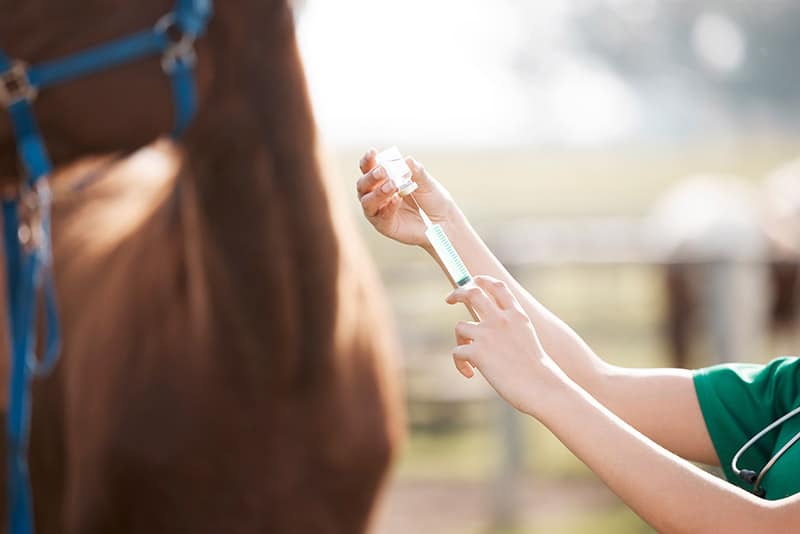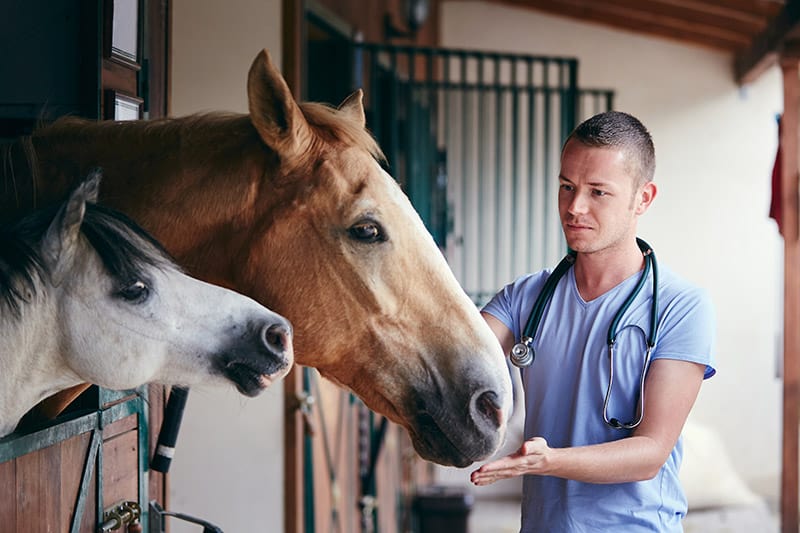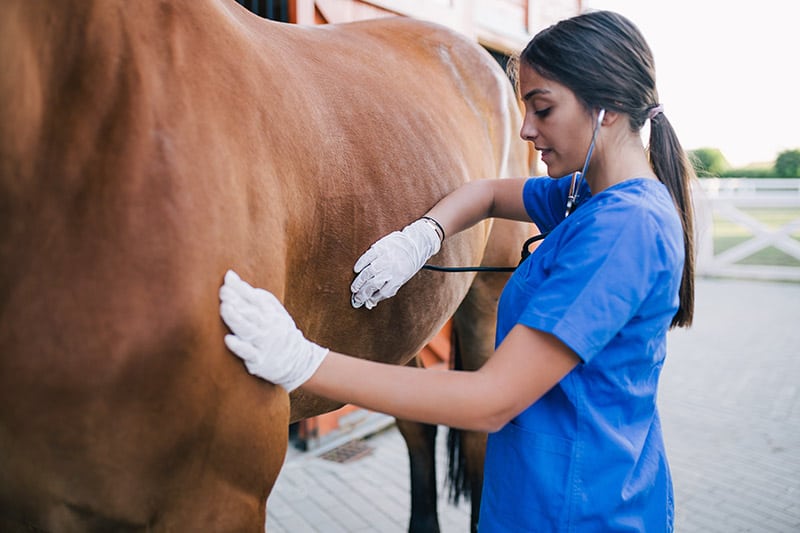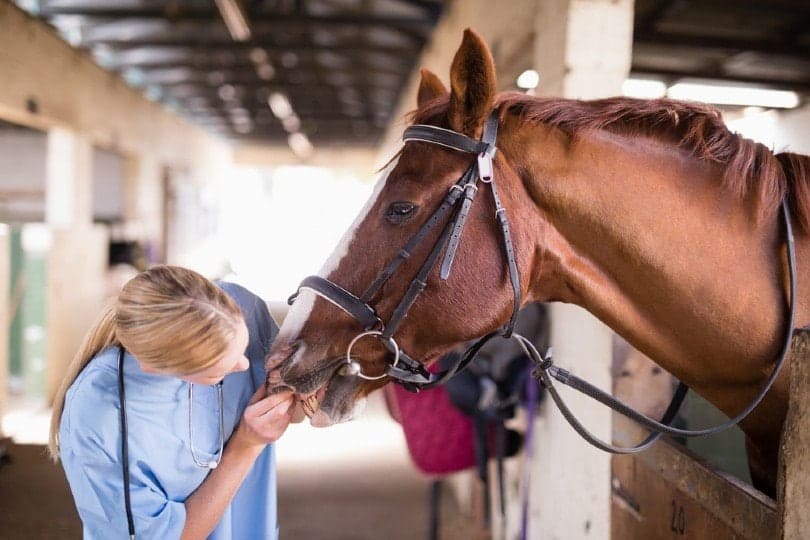You can help avoid horse health issues by paying close attention to your pet, and by providing good horse care!
Most of the horse breeds are very hardy animals. Yet like all animals they are subject to their own set of horse ailments. They are susceptible to a number of common horse health issues and problems ranging from illness and disease, to injuries. Many horse problems can be avoided however, with a regular, ongoing schedule of good care and watchful attention.
Horses are large animals that spend most of their time on their feet. This makes them prone to leg and feet problems, and often times, abnormal gait problems. When riding horses, they can get bruised and loose hair, and may even develop ‘saddle sores’ from an ill fitting saddle. Sport horses also have some special considerations. They can suffer from a number of running and jumping related injuries. Horses are quite gregarious and will thrive when kept with other horses, but this can also make them susceptible to communicable diseases as well.
As a horse keeper, there are some good steps to take to make sure your horse is as healthy as it can be. Provide regular horse care that includes horse vaccines, a proper diet, grooming and exercise. Developing good horse riding skills, and riding with proper equipment that is suited to your horse, are also very important.
Proper horse husbandry will help you to avoid horse ailments. Yet no matter how regular or well you provide for your horse, you could still run into a number of health issues. Below is a list of common horse problems, along with their treatments and horse vaccines.
Horse problems, treatments and horse vaccines
Tetanus
Horses are exposed to tetanus when they get a deep cut or puncture wound. They are more susceptible to the disease than humans and it is often fatal. Symptoms include a tenseness of the muscles, locked jaw, and the third eyelid is exposed. Tetanus can be prevented with horse vaccines. Be sure to get your horse vaccinated once a year.

Strangles (Distemper)
Strangles, also known as distemper, is a respiratory infection caused by bacteria. It is spread between horses by mucus, usually on people’s hands and clothing, and is highly contagious. It can affect all horses, but younger horses are more vulnerable.
Strangles can be followed by serious complications, including heart disease, pneumonia, and internal abscesses. Symptoms include loss of appetite, fever, and a runny nose with white or yellow drainage. The lymph glands in the throat become swollen and can sometimes abscess and drain. The best way to prevent strangles is to vaccinate your horse yearly, but for this ailment the horse vaccines are not 100 percent effective so it is also important to minimize your horse’s exposure to strange horses.
Influenza
Equine influenza is an upper respiratory infection caused by a virus. It has similar symptoms to the human strain, namely depression, loss of appetite, fever, runny nose with white mucus, and coughing. It is spread through the air by sneezing and coughing, and on people’s hands and clothes. There are horse vaccines available, but immunity lasts for only two to three months so boosters are needed frequently. Most horse owners vaccinate for influenza twice a year.
Rhinopneumonitis
Rhinopneumonitis is an upper respiratory infection caused by a virus. It is quite contagious and is spread by sneezing, coughing, and contact with infected horses. Young horses are especially susceptible, but horses of any age can contract the disease.
This is a serious problem for breeding farms because Rhinopneumonitis causes pregnant mares to abort. Symptoms are similar to those of a cold (coughing, runny nose, fever). Horse vaccines are available and they are usually administered twice a year.

Equine Encephalomyelitis
Equine Encephalomyelitis is a serious disease caused by a virus that causes brain damage and it can be fatal. It is carried by birds and spread to horses when a mosquito bites a bird and then a horse. Early symptoms are fever and excitability, then drowsiness and depression.
An infected horse may walk in circles or stand with his head pressed against a wall. The horse will eventually become paralyzed and may die within two to four days. There are three types of encephalomyelitis: Eastern, Western, and Venezuelan, and there are vaccines available for all three types. In Northern regions with fewer mosquitos, vaccines are usually given yearly; whereas in warm, humid regions, boosters may be needed every three to six months because the mosquitos are active year round.
Rabies
This is a rabies virus present in the brain and nervous system of affected animals. It is dangerous because people can contract the disease as well. The rabies virus is transmitted by the saliva of an infected animal, usually by biting. Symptoms are depression, lack of coordination, personality change or unusual behavior, and paralysis.
If there is any possibility that a horse could have rabies, do not handle him and call the veterinarian immediately.
Horses are generally vaccinated for the rabies virus once a year.
Intestinal worms
All horses carry intestinal worms, so they need to be given a dewormer on a regular basis. The interval varies depending on the climate and the prevalence of worms where the horse is located. In wetter areas, worming should be done every month; whereas in a desert climate, it may only need to be done every three months. You can also reduce worms by keeping stalls clean and keeping manure away from where horses are eating.

Colic
“Colic” means belly pain, and can range from minor pain to very severe. It is the most common cause of death among horses. This is because repeated colics can cause severe damage to the intestinal tract and it is possible to twist or tear the intestines, which causes death unless surgery is performed immediately.
Colic can be caused by gas, worms, sand in the gut, spoiled feed, or an obstruction. Mild symptoms include lying down, lethargy, and biting at the stomach. A more serious colic will cause a horse to lie down and thrash violently, paw or kick at his belly, and break out in a sweat.
As soon as you notice any of these symptoms, you should call your veterinarian. Don’t let your horse lie down or thrash. You can walk him to try to activate the intestines and help him pass gas or move the blockage.
To prevent colic, worm your horse regularly, try to minimize his ingestion of sand by providing a feeder that keeps the feed off the ground, and feed bran mash or beet pulp regularly to help clear his system of sand. If a horse has coliced once, he is more prone to colicing again so you may have to adjust his food to make it easier to pass by wetting his feed or feeding bran or beet pulp.
Laminitis
Laminitis is a disorder usually caused by overeating grain or too much lush grass, and not getting enough exercise. Toxins build up inside the horse’s hooves causing the bones inside the hoof to drop or rotate. This usually affects the front hooves since they bear most of the horse’s weight, but can affect all four.
Laminitis becomes incredibly painful for the horse to bear weight on those feet. And infected horse will stand with his back arched, putting more of his weight onto the hind feet. This is called the laminitis stance. His front feet will feel hot to the touch and you should be able to feel his pulse in the digital artery that runs along the back of the lower leg.
Call the veterinarian immediately and remove any grain from his feeder. You can hose his legs with cold water, or if he will allow it, you can have him stand in a bucket of cold water. Confine him to a small stall so that he cannot move around too much. He may also require corrective shoeing to correct any resulting hoof problems.
Featured Image Credit: wavebreakmedia, Shutterstock
